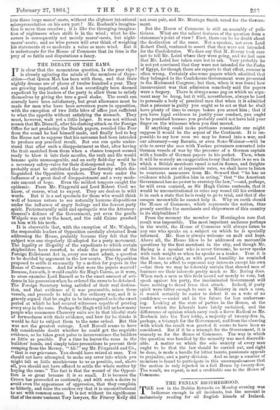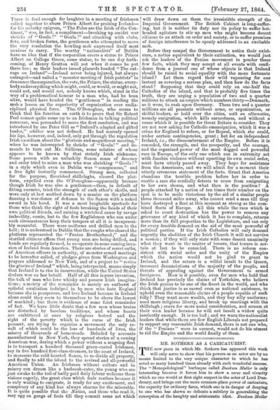TAE, FENIAN BROTHERHOOD. T HE row in the Dublin Rotunda on
Monday evening was ludicrous enough in all incidents, but the account is melancholy reading for all English friends of Ireland. There is food enough for laughter in a meeting of Irishmen called together to abuse Prince Albert for praising Ireland— for his unlucky epigram, "The Poles are the Irish of the Con- tinent," was, in fact, a compliment—breaking up amidst war shrieks of " Goula !" " Goula !" and attacking with clubs, fists, and broken forms, the gentlemen who attempted to move the very resolution the howling mob expressed itself most anxious to carry. The worthy "nationalists" of Dublin have an idea that if the corporation erects a statue to Prince Albert on College Green, some statue, to be one day forth- coming, of Henry Grattan will not when it comes be put there too ; so their leaders issued placards headed "The out- rage on Ireland"—Ireland never being injured, but always outraged—and called a " monster meeting of Irish patriots" to denounce thecorporation, the vote, the Prince, the statue, every- body and everything which might, could, or would, or might not, could not, and would not, nobody knows which, stand in the way of a problematical honour to a man who, had he been alive, would have headed the " gentlemen " in reading the mob a lesson on the superiority of organization over undis- ciplined physical force. The. O'Donoghne, who seems to think that his function on earth is to prove that Sir Robert Peel cannot quite come up to an Irishman in talking political nonsense, was persuaded to move the first resolution, and was introduced by one Peter Gill as "Ireland's adopted and gifted leader," whither was not defined. He had scarcely opened his lips, however, and, indeed, only got through the regulation Irish exordium about the "glorious and magnificent meeting," when he was interrupted by shrieks of " Goula!" and de- mands to turn out Mr. Sullivan, some relative of whom appears to be known by that strictly Irish nickname. Some person with an unluckily Saxon sense of decency and order tried to seize a man who was shrieking " Goula !" in a style which even in Dublin was " conspicuous," and a free fight instantly commenced. Strong men, collected for the purpose, flourished shillelaghs, cleared the plat- form, expelled even the O'Donoghue—apparently because though Irish he was also a gentleman—then, in default of fitting enemies, tried the strength of each other's skulls, and were only at last soothed down by a maniac on the platform dancing a war-dance of defiance to the Saxon with a naked sword in his hand. It was a most laughable spectacle for those who think the sight of fools breaking the heads of their own political friends, and ruining a wretched cause by savage imbecility, comic, but to the few Englishmen who can under such circumstances keep their tempers at all it is inexpressi- bly mournful. There were uniforms and drilled men in the hall ; it is understood in Dublin that the roughs who cleared the platform represented the " Fenian Brotherhood;" and the startled citizens affirm that young men are being drilled, and bands are regularly formed, to co-operate in some coming inva- sion of Ireland from America. There are stories of secret oaths, of American officers in authority, of monster armed meetings to be hereafter called, of pledges given from Washington and prayers addressed to New York, and of a project to " revive the glories of Ireland" which, being interpreted, means simply that Ireland is to rise in insurrection, while the United States declare war on her behalf. Half of all this is pure invention, the talk of men who love whisky and possess Irish imagina- tions ; a moiety of the remainder is merely an outburst of spiteful exultation indulged in by men who hate England because she is prosperous, and love Ireland because in Ireland alone could they seem to themselves to be above the lowest of mankind ; but there is evidence of some faint remainder of fact. We have little doubt that a few men whose brains are disturbed by baseless traditions, and whose hearts are embittered at once by religious hatred and the sight of the poverty which is the curse of the Irish peasant, are trying to organize a movement the only re- sult of which could be the loss of hundreds of lives, the misery of thousands of homesteads. Deluded by accounts manufactured in New York, they spread stories of a coming American war, during which a power without a seagoing fleet is to transport a hundred thousand green-coated Irishmen, say in five hundred first-class steamers, to the coast of Ireland, to massacre the cold-hearted Saxon, to re-divide all property, and finally to add the island to the revived and all-powerful American Union. An Irishman without culture and in misery can dream like a hasheesh-eater, the young who are just awake to the toil of badly paid daily labour welcome these visions eagerly, the great class which feels restless because it is only waiting to emigrate, is ready for any excitement, and conspiracy of any kind has always charms for the miserable. It is quite possible that the Nation, and those who read it, may egg on gangs of fools till they commit some act which will draw down on them the irresistible strength of the Imperial Government. The British Cabinet is long-suffer- ing, but it is neither its duty nor its policy to suffer hot- headed agitators to stir up men who might become decent citizens to an attack on order and society, or to suffer promises of foreign interference to be openly addressed to an excitable mob.
Before they compel the Government to notice their exist- ence, a notice equivalent to their extinction, we would just ask the leaders of the Fenian movement to ponder these few facts, which they may accept at all events with confi- dence from a journal one of whose objects is that Ireland should be raised to social equality with the more fortunate island? Let them regard their wild vapouring for one instant as covering a serious plan, and then how do the facts stand ? Supposing that they could rely on one-half the Catholics of the island, and that is probably five times the truth, they are urging a population of two and a quarter millions to attack an empire which numbers thirty—Denmark, as it were, to rush upon Germany. These two and a quarter millions are all peasants without arms, or organization, or skilful leaders, or hold over the cities, with an alternative, namely emigration, which kills earnestness, and without a cause which it is possible for Great Britain to consider. They are not now asking for Catholic emancipation, which it was a crime for England to refuse, or for Repeal, which she could, under certain contingencies, grant ; but for an independent Ireland, i.e., the dismemberment of the Empire. Before it is conceded, the strength, and the prosperity, and the courage, and the organized power of the most dogged and powerful race in Europe, of the only one which can in extremity act with Jacobin violence without upsetting its own social order, must have utterly passed away. They hope for assistance from the Americans, and we will admit for a moment their utterly erroneous statement of the facts. Grant that America abandons the terrible problem before her in order to enable a race she cordially detests to cease from emigrating to her own shores, and what then is the position? A people attacked by a nation of ten times their number on the spot is to be made victorious by the aid of a similar people three thousand miles away, who cannot send a man till they have destroyed a fleet at this moment as strong as the com- bined fleets of Europe. All this while the race which is asked to court destruction has the power to remove any grievance of any kind of which it has to complain, returns more than its full proportion to the Legislature, and can rely for every feasible demand on the aid of the most powerful of political parties. If the Irish Catholics will only demand urgently the abolition of the Irish Church it will not survive a session ; if they will only state with some deceiit unanimity what they want in the matter of tenure, that tonure is cer- tain at last to be conceded. There is no reform con- sistent with social order and the unity of the Empire which the nation would not be glad to grant to Ireland, and the return is a wilful insult to the Queen, incessant denunciations of the majority of the people, and threats of appealing against the Government to armed foreigners. How is it possible, even for men who hold that Ireland has precisely the claims of Yorkshire, who believe the Irish genius to be one of the finest in the world, and who think that justice is as sacred even as national existence, to uphold even the reasonable claims of a people capable of such folly ? They want more wealth, and they buy silly uniforms; need more religious liberty, and break up meetingi with the shillelagh ; crave for more social consideration, and scream at their own leader because he will not insult a widow quite insolently enough. It is too bad ; and we warn the nationalist leaders that while there are few English Liberals not prepared to support any reasonable Irish demand, there is not one who, if the " Fenians " were in earnest, would not do his utmost to rid the Empire and the world finally of them.































 Previous page
Previous page